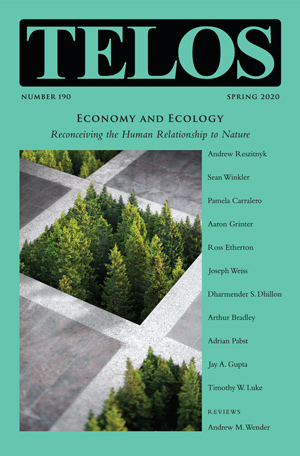In today’s episode of the Telos Press Podcast, David Pan talks with Nir Evron about his article “Hannah Arendt, Thinking, Metaphor,” from Telos 196 (Fall 2021). An excerpt of the article appears here. In their conversation they discussed how Arendt understands the difference between a metaphorical and a literal view of the world; her view of metaphor as a bridge between the thinking ego and the social and political world that it inhabits; the tension in Arendt’s The Life of the Mind between her desire to move beyond metaphysical assumptions and her unwillingness to let go of the philosophical tradition; the consequences for morality of her conception of metaphor; the impact of the Eichmann trial on Arendt and how it prompted her to explore the connection between thoughtlessness and evil; and her belief that the individual’s ability to think in a critical fashion might serve as a check on the descent into totalitarianism. If your university has an online subscription to Telos, you can read the full article at the Telos Online website. For non-subscribers, learn how your university can begin a subscription to Telos at our library recommendation page. Print copies of Telos 196 are available for purchase in our online store.
|
By Telos Press · Thursday, December 9, 2021 Topics: constructivism, Hannah Arendt, language, Martin Heidegger, metaphor, metaphysics, philosophy, Plato, podcast, Telos 196, thinking By Aaron Grinter · Thursday, April 16, 2020 Aaron Grinter’s “Metaphors in Science: Lessons for Developing an Ecological Paradigm” appears in Telos 190 (Spring 2020): Economy and Ecology: Reconceiving the Human Relationship to Nature. Read the full article at the Telos Online website, or purchase a print copy of the issue in our online store. Individual subscriptions to Telos are available in both print and online formats. |
Current IssueSubscribe to TelosNow Available!Recent PostsTELOSscope Archives |
|||
|
Telos Press Publishing · PO Box 811 · Candor, NY 13743 · Phone: 212-228-6479 Privacy Policy · Data Protection Copyright © 2025 Telos Press Publishing · All Rights Reserved Our website uses cookies to enhance your experience and show you more relevant content.
For more information, please see our privacy policy. By using our site, you agree to our use of cookies. OK |
||||



